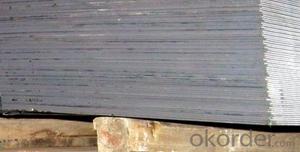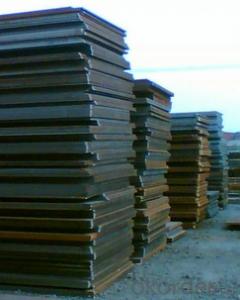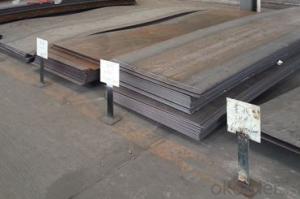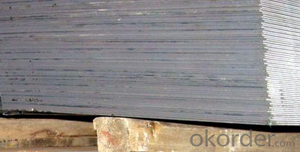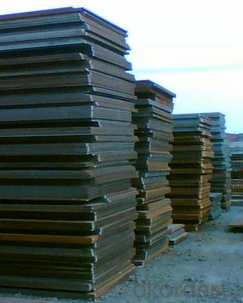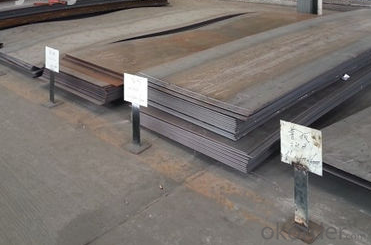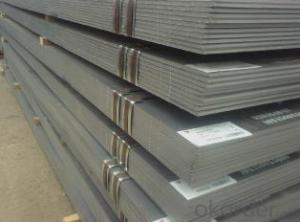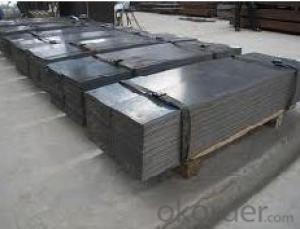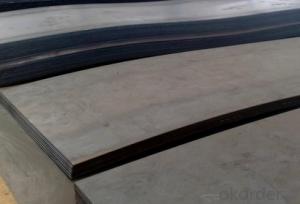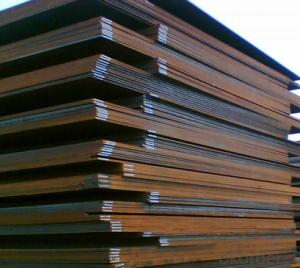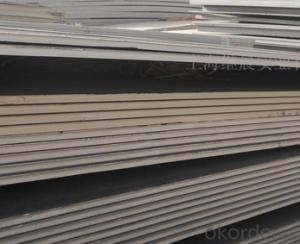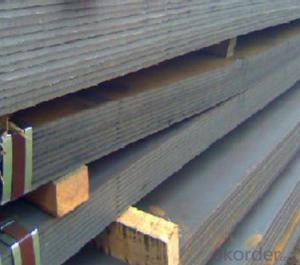Hot Rolled Carbon Steel Plate,Carbon Steel Sheet Q235d, CNBM
- Loading Port:
- Qingdao
- Payment Terms:
- TT OR LC
- Min Order Qty:
- 10 pc
- Supply Capability:
- 30 pc/month
OKorder Service Pledge
OKorder Financial Service
You Might Also Like
Quick Details
| Standard: | AISI, ASTM, GB, JIS | Grade: | Q195,Q235,Q345,A36,C45 | Thickness: | 1.0-30MM |
| Model Number: | Q235,Q195,Q345 | ||||
| Type: | Steel Plate | Technique: | Hot Rolled | Surface Treatment: | Coated |
| Application: | Ship Plate | Special Use: | Silicon Steel | Width: | 30-2000mm |
| Length: | as your requirement | standard: | hot rolled | Surface: | Anti-rust oil |
Packaging & Delivery
| Packaging Details: | seaworthy packages or as customers' require |
| Delivery Detail: | within 15 days after the advance payment |
Hot rolled steel plate
1 carbon steel plate 3mm thick General information
| Product name | Type | Specification | Implementation of GB | ||
| thick | wide | long | |||
| Carbon structural steel | Q195,Q215, Q235A,Q235B, Q235C,Q255, Q275 | 4-120 | 1500-4500 | 6000-12000 | GB/T700-2006 |
| Low-alloy structural steel | Q295,Q345A, Q345B,Q2345C | 4-120 | 1500-4500 | 6000-12000 | BG/T1591-1994 |
| Quality carbon structural stee | 30-50 | 4-120 | 1500-4500 | 6000-12000 | BG/T699-1999 |
| Ship steel | CCSA,CCSB | 4-120 | 1500-4500 | 6000-12000 | materials and welding condition |
| CCSAH32,CCSAH36 CCSDH32,CCSDH36 | 4-120 | 1500-4500 | 6000-12000 | materials and welding condition or GB 712-2000 | |
| Boiler steel | 20g,22Mng, 16Mng,19Mng | 4-120 | 1500-4500 | 6000-12000 | GB 713-1997 |
| Pressure vessel steel | 1622Mng,20R, 15MnVR,15MnVNR | 4-120 | 1500-2700 | 6000-12000 | GB 6654-1996 |
| European standard plate
| S235JR,S235J0, S275JR,S275J0, S275JR2,S355JR, S355J0,S355J2 | 4-120 | 1500-4500 | 6000-12000 | EN 10025 |
| Japanese standard plate | SS400,SS400-B | 4-120 | 1500-4500 | 6000-12000 | JIS G3101-2004 |
2 carbon steel plate 3mm thick detail specification
Material:
A283Gr.D/A573Gr.65,A516Gr65,A516Gr70,A284Gr.D
SS400,SS300,CCSB A36,A32,LRA32,LRB,Q235
Q195,Q235,Q345,SS400,ASTM A36,E235B
Thickness: 4mm-120mm
width: 1500mm-4500mm
Length:2-10m ,accordingly
Thickness | 4-120mm |
Width | 1500-4500mm or as custom's request |
Length | 2-12m,as your requirment |
Technique | Cold rolled or hot rolled |
Surface treatment | Bare, galvanized coated or as customer's requirements. |
Standard | ASTM,EN,GB,JIS,GB |
Material | A283Gr.D/A573Gr.65,A516Gr65,A516Gr70,A284Gr.D SS400,SS300,CCSB A36,A32,LRA32,LRB,Q235 Q195,Q235,Q345,SS400,ASTM A36,E235B |
Terms of Payment | L/C or T/T |
Chemical composition | C≤0.004%;Si≤0.030%; Mn ≤0.17%;P≤0.012%; S≤0.010%; Fe balance |
Delivery Detail | within 30days once receive deposite or confirm L/C |
Packing | Standard export packing,or as requirement |
3 carbon steel plate 3mm thick application:
construction,machinery manufacturing, container manufacturing, shipbuilding, bridge construction. Can also be used to manufacture a variety of containers, the furnace shell, furnace plate, bridge and vehicle static steel plate, low alloy steel plate,shipbuilding plate, boiler plate, pressure vessel plate, pattern plate, tractor parts, automobile frame steel plate and welding components
- Q: Can steel sheets be laminated with other materials?
- Indeed, it is possible to laminate steel sheets with different substances. Lamination involves the fusion of two or more materials to form a composite material that boasts improved characteristics. When it comes to steel sheets, they can be laminated with a variety of materials including plastics, polymers, wood, and even other metals. This technique is frequently employed to enhance the strength, longevity, resistance to corrosion, and visual appeal of steel sheets. Laminated steel sheets can be observed in numerous sectors such as automotive, construction, aerospace, and furniture production.
- Q: What is the process of pickling steel sheets?
- The process of pickling steel sheets involves immersing the sheets in an acidic solution, typically a mixture of hydrochloric acid and water, to remove any scale or oxide layers. This helps to clean the surface of the steel and improve its corrosion resistance. After pickling, the steel sheets are rinsed and dried before further processing or storage.
- Q: Can steel sheets be used for walkways or platforms?
- Certainly! Walkways or platforms can be constructed using steel sheets. Steel sheets are frequently employed in industrial and commercial settings owing to their durability, strength, and ability to withstand diverse environmental factors. They can be fabricated and installed to establish robust walkways or platforms capable of enduring heavy pedestrian traffic or the movement of equipment and machinery. Steel sheets can also be customized to fulfill specific design requirements, such as incorporating non-slip surfaces, raised edges for safety, or perforations for drainage. Furthermore, steel sheets necessitate relatively minimal upkeep and can be effortlessly cleaned and maintained, making them a perfect choice for walkways or platforms in various applications, including factories, warehouses, construction sites, and even outdoor areas.
- Q: Can steel sheets be used in food processing industries?
- Indeed, steel sheets find applicability in the realm of food processing industries. The utilization of stainless steel sheets is widespread in these industries owing to their myriad advantageous characteristics. Stainless steel, being impervious to corrosion, is of utmost importance in an environment where food is processed, as it effectively prevents contamination and guarantees the safety of the final product. Moreover, steel sheets are easily cleaned and maintained, rendering them the ideal choice for industries that prioritize hygiene. Furthermore, stainless steel exhibits non-reactivity towards food, thereby eliminating the risk of harmful chemical leaching into the processed food. The versatility of steel sheets is evident in their various applications within food processing industries, ranging from countertops, worktables, shelving, to equipment surfaces.
- Q: What is the minimum order quantity for the steel sheets?
- The minimum order quantity for the steel sheets is 100 units.
- Q: What is AO steel plate?
- The steel plate can be placed in the soft tissue without the need to remove periosteum and reduce the damage to the bone. The steel plate does not need to be completely shaped with the backbone, and it is feasible for minimally invasive percutaneous plate fixation
- Q: What are the different types of steel sheet coatings?
- There are several different types of steel sheet coatings available in the market, each with its own unique properties and advantages. Some of the most common types include: 1. Galvanized Coating: This is one of the most widely used coatings for steel sheets. It involves applying a layer of zinc to the surface of the steel, which provides excellent corrosion resistance and protects the steel from rusting. Galvanized coatings are commonly used in outdoor applications such as roofing, fencing, and automotive parts. 2. Galvannealed Coating: Similar to galvanized coating, galvannealed coating also involves applying a layer of zinc to the steel surface. However, in this process, the coated steel is passed through a high-temperature annealing process, which forms a coating of iron-zinc alloy. This type of coating offers enhanced paintability and weldability, making it ideal for applications that require subsequent painting or welding. 3. Aluminized Coating: Aluminized coatings involve applying a layer of aluminum to the steel surface. This provides excellent heat resistance and corrosion resistance, making it suitable for applications that involve high temperatures, such as exhaust systems and ovens. Aluminized coatings also have good reflectivity properties, making them useful in reflective insulation applications. 4. Organic Coatings: There are various organic coatings available for steel sheets, including epoxy, polyester, and polyurethane coatings. These coatings are often applied in the form of paints or powder coatings and provide a protective layer that enhances the steel's durability and appearance. Organic coatings can be customized to offer specific properties, such as UV resistance, chemical resistance, or decorative finishes. 5. Tin Coating: Tin coatings are commonly used in the food packaging industry. They provide a barrier between the steel sheet and the food product, preventing any interactions that could affect the food's quality or safety. 6. Other Specialty Coatings: There are several other specialty coatings available for specific applications. These include zinc-nickel coatings, which offer enhanced corrosion resistance, and ceramic coatings, which provide high-temperature resistance and excellent electrical insulation properties. Overall, the choice of steel sheet coating depends on the specific requirements of the application, such as corrosion resistance, heat resistance, or aesthetic appeal. It is important to carefully consider the properties of each coating type to ensure the best performance and longevity of the steel sheet in its intended use.
- Q: Can steel sheets be used in automotive applications?
- Yes, steel sheets can be used in automotive applications. Steel is commonly used in the automotive industry for various components and structures due to its strength, durability, and cost-effectiveness. It is used for body panels, chassis, frames, and other structural parts to provide the necessary strength and safety in vehicles.
- Q: What is the minimum order quantity for the steel sheets?
- You must order at least 100 units of steel sheets.
- Q: How are steel sheets protected against rusting?
- Corrosion protection is employed to safeguard steel sheets against rusting. Several techniques are utilized for this purpose: 1. Galvanization: Zinc is applied as a coating on the steel sheets. Acting as a sacrificial anode, the zinc corrodes in lieu of the steel when exposed to moisture or oxygen. Consequently, a barrier is formed to shield the steel from rust. 2. Painting: A layer of paint is applied to the steel sheets, creating a protective barrier against moisture and oxygen. This physical barrier prevents contact between these elements and the steel, thus reducing the likelihood of rust formation. 3. Powder coating: Dry powder is spread onto the steel sheets and then heated to establish a protective layer. The powder liquefies and fuses into a smooth coating, offering remarkable resistance to rust and corrosion. 4. Electroplating: The steel sheets are immersed in a bath containing a metal coating solution, such as zinc or chromium. By passing an electric current through the bath, the metal coating bonds with the steel, serving as a safeguard against rust. 5. Phosphating: A chemical process deposits a layer of zinc or manganese phosphate onto the steel sheets. This layer enhances the adhesion of paint or other coatings, providing a surface resistant to corrosion. These techniques find widespread usage in various industries to avert the rusting of steel sheets. The selection of a specific method is contingent upon factors such as cost, durability requirements, and the intended environment for the steel sheets.
Send your message to us
Hot Rolled Carbon Steel Plate,Carbon Steel Sheet Q235d, CNBM
- Loading Port:
- Qingdao
- Payment Terms:
- TT OR LC
- Min Order Qty:
- 10 pc
- Supply Capability:
- 30 pc/month
OKorder Service Pledge
OKorder Financial Service
Similar products
Hot products
Hot Searches
Related keywords
